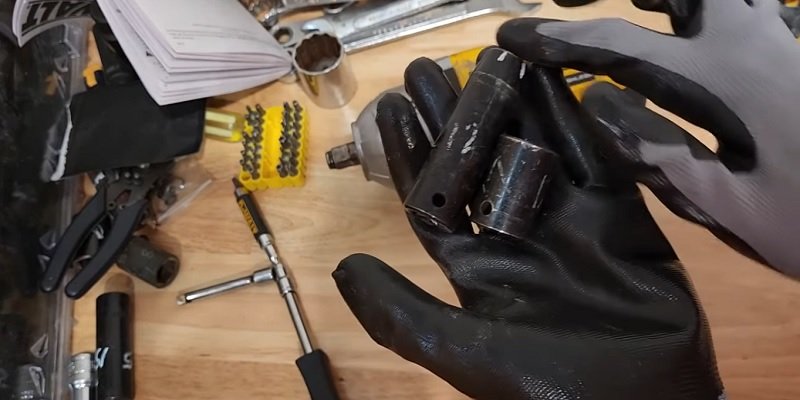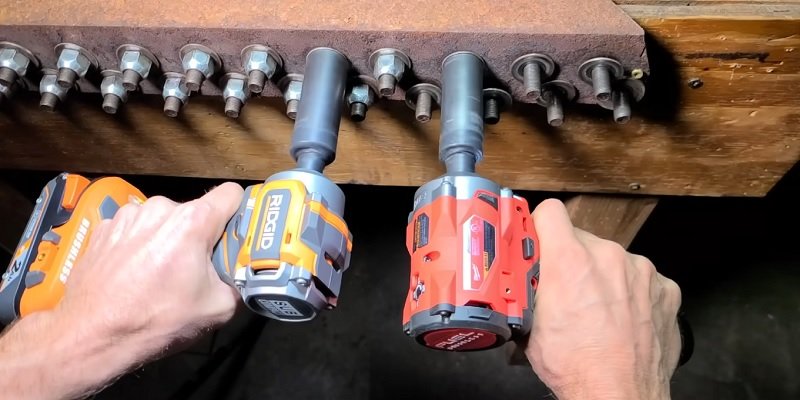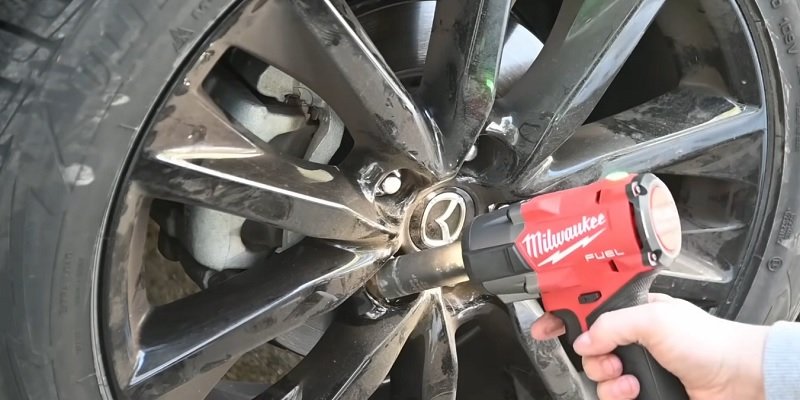Disclosure: This post contains affiliate links and I will be compensated if you make a purchase after clicking through my links. Learn More
Black sockets should be used with an air impact wrench because they are coated with Parkerizing, providing increased resistance and protection against corrosion. Contrary to regular sockets, impact sockets are designed to support and absorb the momentary shock of each impact, preventing cracks or breaks and prolonging the socket’s lifespan.
By using regular sockets on powered tools, there is a high possibility of ruptures, which can be dangerous. Therefore, it is essential to use the appropriate socket to ensure safety and optimize the performance of an air impact wrench.

Importance Of Using The Right Socket
An air impact wrench is a powerful tool used for various mechanical tasks. One crucial aspect of using an air impact wrench correctly is using the right socket. Selecting the appropriate socket can have a significant impact on the performance and longevity of both the wrench and the socket itself.
Impact Of Using The Wrong Socket With An Air Impact Wrench
Using the wrong type of socket with an air impact wrench can have detrimental effects on both the tool and the socket. It is important to note that regular sockets are not designed to withstand the high torque and sudden impacts generated by an air impact wrench. The key differences between regular sockets and impact sockets lie in their construction and material.
Impact sockets are specifically designed to handle the high torque and repetitive impacts of an air impact wrench. They are made of tougher materials, such as chrome molybdenum steel, which can withstand the force exerted by the wrench without getting damaged. On the other hand, regular sockets, often made of chrome-plated steel, are more likely to crack or shatter when subjected to the extreme forces of an air impact wrench.
When a regular socket is used with an air impact wrench, it can lead to multiple issues. The socket may fail to effectively transfer torque to the fastener, resulting in incomplete or uneven tightening. This can compromise the integrity of the fastener and potentially cause it to loosen over time. Moreover, the socket itself may get deformed or damaged, making it unusable for future tasks.
Potential Damage To The Wrench And Socket
Using the wrong socket with an air impact wrench not only poses a risk to the socket but also to the wrench itself. The high torque and sudden impacts generated by the wrench can cause stress and strain on its internal components. When a regular socket is used, it may not be able to handle the forces exerted by the wrench, leading to premature wear and tear of the wrench.
This can result in decreased performance, reduced lifespan, and increased maintenance costs for the wrench. Additionally, the damage caused by using the wrong socket can be cumulative. If the socket fails, it can, in turn, damage the anvil or drive mechanism of the wrench, further compromising its functionality.
Safety Risks For The User
Using the wrong socket with an air impact wrench also poses significant safety risks for the user. When a regular socket fails under the force generated by the wrench, it can cause fragments and debris to scatter, potentially injuring the user or others in the vicinity. The sudden release of the fastener can also pose hazards, leading to accidents and damage to the workpiece.
Moreover, an improper socket fit can cause the wrench to slip or disengage from the fastener during operation. This can result in the wrench hitting the user’s hand or body, leading to injuries. Therefore, using the right socket is essential to ensure the safety of the user and minimize the potential for accidents.
In conclusion, using the right socket with an air impact wrench is of utmost importance. It not only ensures optimal performance and longevity of the wrench and socket but also reduces the risk of damage, accidents, and injuries. Investing in quality impact sockets designed specifically for air impact wrenches is a wise choice to ensure a safer and more efficient work environment.
Understanding Impact Sockets
When it comes to using an air impact wrench, it’s important to have the right type of socket. Impact sockets are specially designed to withstand the high torque produced by air impact wrenches. In this section, we will explore what impact sockets are, how they differ from regular sockets, and their key features and characteristics.
What Are Impact Sockets?
Impact sockets are sockets specifically designed to be used with air impact wrenches. These tools are commonly used in automotive and construction industries for tasks that require high torque and fastening power. Unlike regular sockets, impact sockets are built to withstand the intense forces generated by impact wrenches, ensuring durability and preventing socket breakage.
How Are They Different From Regular Sockets?
There are several key differences between impact sockets and regular sockets:
Material: Impact sockets are typically made from high-quality chrome molybdenum steel, which provides exceptional strength and impact resistance. Regular sockets, on the other hand, are usually made from chrome vanadium steel or other materials that may not be as durable.
Thickness: Impact sockets are generally thicker and heavier than regular sockets. This extra thickness helps to distribute the torque more evenly, reducing the risk of socket failure.
Drive Design: Impact sockets often feature a 6-point drive design, which provides better grip on fasteners and reduces the likelihood of rounding or slipping. Regular sockets may have a 6-point or 12-point design, which can be less effective for high torque applications.
Surface Treatment: Impact sockets are commonly coated with a black oxide or phosphate finish. This coating enhances resistance to corrosion and provides a better grip on fasteners. Regular sockets may have a polished chrome finish, which is more prone to chipping and corrosion.
Features And Characteristics Of Impact Sockets
Impact sockets have specific features and characteristics that make them ideal for use with air impact wrenches:
High Torque Capacity: Impact sockets are designed to handle the high torque produced by impact wrenches, ensuring they can withstand the forces without breaking or deforming.
Durability: The construction of impact sockets, using strong materials and thicker walls, makes them more resistant to wear and tear, allowing for long-lasting performance.
Reduced Wear on Fasteners: The 6-point drive design and the black oxide/phosphate coating of impact sockets provide a secure grip on fasteners, minimizing the chances of rounding or slipping, which can cause wear to both the socket and the fastener.
Corrosion Resistance: The black oxide or phosphate finish of impact sockets helps protect them against corrosion, ensuring they remain in good condition even in harsh environments.
Compatibility: Impact sockets are available in various sizes and drive configurations, allowing for compatibility with different air impact wrenches and fastener types.
Understanding impact sockets is crucial for ensuring safe and efficient use of an air impact wrench. By using the right socket type, you can achieve optimal performance and extend the lifespan of both the socket and the wrench.
Factors To Consider When Choosing An Impact Socket
Size And Compatibility With The Air Impact Wrench
One of the most important factors to consider when choosing an impact socket is its size and compatibility with the air impact wrench you are using. The socket needs to fit securely onto the wrench to ensure efficient and safe operation.
Most air impact wrenches come with specific size requirements for sockets, so it is crucial to choose the socket that matches the specifications provided by the manufacturer. Using the wrong size socket can lead to reduced performance, damage to the tool, and potential safety hazards.
Material And Construction Of The Socket
The material and construction of the impact socket play a significant role in its durability and performance. Impact sockets are typically made from high-strength materials such as chrome-molybdenum (chrome-moly) steel or heat-treated alloy steel. These materials offer superior strength and resistance to impact forces generated by the air impact wrench. It is important to choose sockets that are specifically designed for impact wrenches, as regular sockets may not withstand the high stresses and impacts and can crack or shatter during use.
Depth And Length Of The Socket
The depth and length of the impact socket are essential considerations when selecting the right socket for your air impact wrench. The depth of the socket determines how far it can reach into recessed areas, while the length of the socket affects the leverage and torque applied by the wrench. It is crucial to choose a socket with an appropriate depth and length based on the specific requirements of your application. Using a shallow socket for deep fasteners or vice versa can lead to inefficiency, difficulty in accessing the fasteners, and potential damage to the socket or fastener.
Surface Finish And Corrosion Resistance
The surface finish and corrosion resistance of an impact socket are crucial for its long-term durability and performance. The socket should have a smooth and polished surface finish to reduce friction and ensure smooth operation. Additionally, it is important to choose sockets that have a protective coating or treatment to enhance corrosion resistance. This is particularly important if you work in environments where moisture, chemicals, or other corrosive substances are present. Choosing sockets with high corrosion resistance will help prevent rusting and extend the lifespan of the socket.
Types Of Impact Sockets
When using an air impact wrench, it is crucial to use the right type of impact socket to maximize the efficiency and performance of the tool. Impact sockets are designed to withstand the high torque and force produced by an impact wrench, ensuring a secure and durable connection with the fastener. There are several types of impact sockets available, each with its own unique features and applications. Let’s take a closer look at the different types of impact sockets:
Shallow Impact Sockets
Shallow impact sockets, also known as regular impact sockets, are the most commonly used type of impact socket. These sockets have a shorter length compared to other types, making them ideal for accessing fasteners in tight or confined spaces. Shallow impact sockets are suitable for a wide range of general automotive and DIY applications and are available in various metric and standard sizes to accommodate different fastener types.
Deep Impact Sockets
Deep impact sockets, as the name suggests, have a longer length compared to shallow impact sockets. These sockets are designed to reach fasteners that are deeply recessed or located in hard-to-reach areas. Deep impact sockets provide additional clearance and allow for a greater degree of flexibility when working with long bolts or studs. These sockets are commonly used in automotive repair, construction, and industrial applications where extended reach is required.
Universal Impact Sockets
Universal impact sockets, also known as 6-point impact sockets, are designed to fit a range of fastener sizes within a specific range. These sockets have six points of contact with the fastener, providing a more secure grip and reducing the risk of stripping or rounding the fastener’s edges. Universal impact sockets are versatile and suitable for a wide range of applications, making them a popular choice among professionals and DIY enthusiasts.
Specialty Impact Sockets
Specialty impact sockets are designed to meet specific needs or handle unique fastener types. These sockets include spark plug sockets, which are built with a rubber insert to securely grip and remove spark plugs without damaging them. Other specialty impact sockets may include hex bit sockets, torx bit sockets, or spline drive sockets, which are designed to fit specific types of fasteners or drive systems. Specialty impact sockets are valuable additions to any toolbox when working with specialized equipment or fasteners.
Choosing the right type of impact socket for your air impact wrench is essential for achieving optimal performance and preventing damage to both the tool and fasteners. Whether you need a shallow socket for tight spaces, a deep socket for extended reach, a universal socket for versatile use, or a specialty socket to accommodate unique needs, there is a wide range of options available to suit your specific requirements.
Frequently Asked Questions Of What Type Of Socket Should Be Used With An Air Impact Wrench?
Can You Use Regular Sockets With An Air Impact Wrench?
Regular sockets should not be used with an air impact wrench. Impact sockets are specifically designed to handle the high torque and sudden impacts generated by the wrench, preventing cracks and breaks. Using regular sockets can result in socket failure and potential safety hazards.
Always use impact sockets for optimal performance and safety.
When Should You Use A 12 Point Socket With An Impact Wrench?
Use a 12 point socket with an impact wrench when you want to ensure safety and prevent cracks or breaks in the socket. Regular sockets are not designed to support the shock of impacts and can lead to ruptures. Using the appropriate socket will prolong the life of the tool and provide optimal performance.
What Do You Need To Use An Air Impact Wrench?
To use an air impact wrench, you need to use impact sockets. These sockets are designed to absorb the shock of each impact, preventing cracks or breaks. Regular sockets are not suitable for use with air impact wrenches and can easily rupture.
Using the correct socket ensures safe and efficient operation.
Do Air Ratchets Require Impact Sockets?
Yes, air ratchets do require impact sockets. Impact sockets are designed to handle the high torque and sudden impacts generated by air ratchets, ensuring safety and preventing damage to the socket. Regular sockets are not built to withstand these forces and may crack or break when used with an air ratchet.
Final Thoughts
In order to maximize the performance and lifespan of your air impact wrench, it is crucial to use the appropriate socket. Black sockets are recommended because they have undergone a process called Parkerizing, which provides more resistance when being used and protects against corrosion.
On the other hand, chrome sockets can cause splits to form in the walls after just a few uses. By using impact sockets specifically designed to absorb the shock of each impact, you can ensure safety and prevent any potential hazards.
So, be sure to choose the right socket for your air impact wrench to maintain its efficiency and durability.








